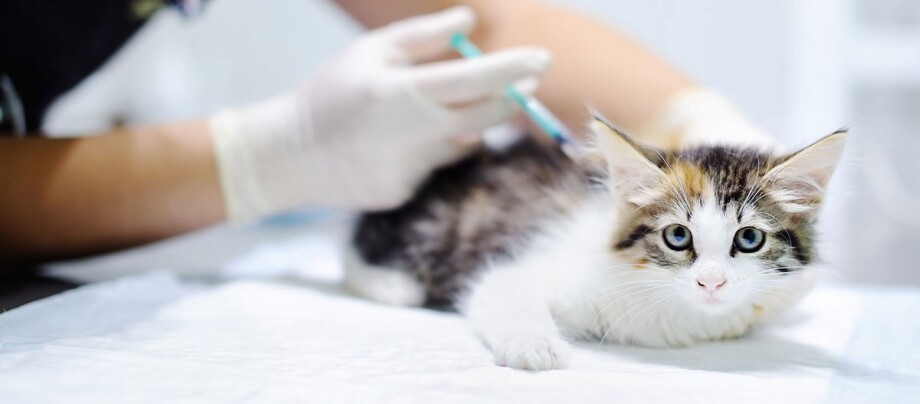Vaccinations for Cats - How to Protect Your Four-Legged Friend
23.11.2022 - Reading time: 7 minutes

Once the immune system is weakened, environmental germs and pathogens that are harmless in themselves can damage the body. The use of vaccines against various diseases saves lives, including those of pets. Cats that live outside or come into frequent contact with other cats should therefore be vaccinated against at least the most common cat diseases. In order to create a comprehensive vaccination protection for your cat, certain rules must also be observed.
How does a cat vaccination work?
Vaccination is the prophylactic administration of a serum that contains antibodies against certain pathogens or that stimulates the body to produce such antibodies itself. The method of administration will differ depending on the type of pathogen against which the cat is being vaccinated. A vaccination enables the organism to fight off an infection with a pathogen by forming suitable antibodies. The pathogen – for example a virus – is not able to latch on in the body, and infection is thwarted.
Every organism – including pets – should receive a vaccination against the most common infectious diseases in its environment to remain healthy. Comprehensive vaccination protection is a basic medical measure especially for outdoor cats, because it is impossible to control their coming into contact with possibly infected conspecifics or otherwise transmitted viruses. Certain vaccinations are also essential if the cat is going to travel: There are strict vaccination requirements for pets entering most countries. However, vaccinations should not be given only when needed or when the disease has already broken out.
What are the cat vaccinations?
Cats are generally more susceptible to infections than other animals. There is actually an interesting evolutionary background to this: because cats are solitary animals, they usually have little contact with animals of the same species. Unlike herd or pack animals, their evolutionary history featured less mutual immunisation.
Cat vaccinations are not only about the life of your own pet: statistics show that the permanent spread of a pathogen can be prevented only if at least 70 percent of the possible carriers are vaccinated. If the vaccination rate falls below this level, a disease that had been successfully suppressed until then can spread like an epidemic. Foregoing vaccination protection out of negligence or principle therefore not only endangers the individual animal, but can also contribute to a renewed epidemic. Vaccination is the most important preventive measure when it comes to combating epidemics.
The mandatory vaccinations that every cat should receive are those against:
- Cat flu
- Feline epidemic
- Rabies
Vaccination against the dreaded rabies is important not only for cats, but should generally be given to all warm-blooded animals. Rabies is a zoonosis, which means that it can spread from animals to humans and result in potentially lethal brain inflammation.
Other useful vaccinations include those against:
- Feline leukaemia (recommended for outdoor cats up to eight years of age)
- feline infectious peritonitis, FIP (only for certain medical indications).
- Bordetella bronchiseptica (bacteria that attack the respiratory tract)
- Chlamydia (bacteria that affect mucous membranes and eyes)
The diseases listed here are spread by different viruses via various transmission routes. Different vaccine serums are therefore administered as a defence. Without vaccination protection, the diseases are often fatal. Cat vaccinations therefore prevent unpleasant diseases – and incidentally reduce veterinary costs – while at the same time protecting cats’ lives.
What vaccinations do cats need when travelling?
Cats that are travelling do not need separate vaccination protection as long as there is no other border crossing. However, it may also be necessary to prove the vaccination status of a cat within the country, if the cat is to be accommodated in a boarding kennel, for example.
If the cat is going abroad, vaccinations against the following diseases must be proven in the EU pet passport:
- Cat flu
- Feline epidemic
- Rabies
Important: When travelling within the EU, immunisation against rabies must be completed 21 days prior to departure.
Warning: Some countries outside the EU, in addition to proof of vaccination, require confirmation by blood test from an approved EU laboratory that the cat is not currently infected with rabies or any other disease. Popular travel countries where this requirement applies include:
- Turkey
- Egypt
- Morocco
- Tunisia
Please check the current regulations with the consulate of your destination country in good time before travelling abroad – that way you will avoid any unpleasant surprises at the border.
How often do you have to vaccinate cats?
Vaccination protection starts with the kitten: Basic immunisation should take place during the first weeks and months of the kitten’s life. Vaccination schedules provide an overview of how often cats should be vaccinated:
Vaccination schedule for cats
8th week of life
- Feline epidemic/cat flu
12th week of life
- Feline epidemic/cat flue (booster)
- Rabies
- Feline leukaemia
16th week of life
- Feline epidemic/cat flu (booster, depending on the vaccine)
- Rabies
- Feline leukaemia (booster)
15th month of life
- Feline infectious disease/cat flu (after basic immunisation annually and depending on the vaccine)
- Rabies (every three years)
- Feline leukaemia (booster)
A combination vaccine is commonly used for feline epidemic diarrhoea and feline rhinotracheitis. One vaccination is effective against pathogens of both diseases. Veterinarians call it RCP and it fights the rhinotracheitis, calicivirus and parvovirus.
If the cat being vaccinated for the first time is already older – for whatever reason – the basic immunisation vaccinations will have to be done at the same intervals. The repeat vaccinations after the basic immunisation ensure that the vaccination protection does not weaken over time.
Repeat vaccinations are given for:
- Cat epidemic: every three years – depending on vaccine and manufacturer
- Cat flu: annually
- Feline leukaemia: annually
- Rabies: annually
What are some key considerations when vaccinating cats?
For cats, vaccinations should always be given in the flank area. That is because there is a sporadic side effect of vaccinations: Fibrosarcomas can sometimes develop at vaccination sites. These are tumours that are triggered in cats either by a subcutaneous injury from the puncture or adjuvants in the vaccine serum. Such a growth is very rare, but can be surgically removed in the flank area without major complications.
A vaccination should be preceded by a comprehensive health check of the animal: If certain pathogens are already present in the body or it is otherwise weakened, the vaccination may be ineffective or cause the animal unnecessary stress. Deworming must also be done at least one week before each vaccination if necessary: Cats with worms are not entirely healthy and treatment will produce stress in the organism. Do you have any concerns about vaccinating your cat, or any other questions about vaccination? Booking an online consultation with Dr. Maxi Zoo is a good and, above all, stress-free alternative for your cat. The experienced vets can advise you via chat – conveniently and with or without a camera.
Recommended vaccinations
8th week of life:
- Feline epidemic/cat flu
12th week of life:
- Feline epidemic/cat flue (booster)
- Rabies
- Feline leukaemia
16th week of life:
- Feline epidemic/cat flue (booster, but depends on the vaccine)
- Rabies
- Feline leukaemia (booster)
15th month of life:
- Feline infectious disease/cat flu (after basic immunisation annually and depending on the vaccine)
- Rabies (every 3 years)
- Feline leukaemia (boosters)



